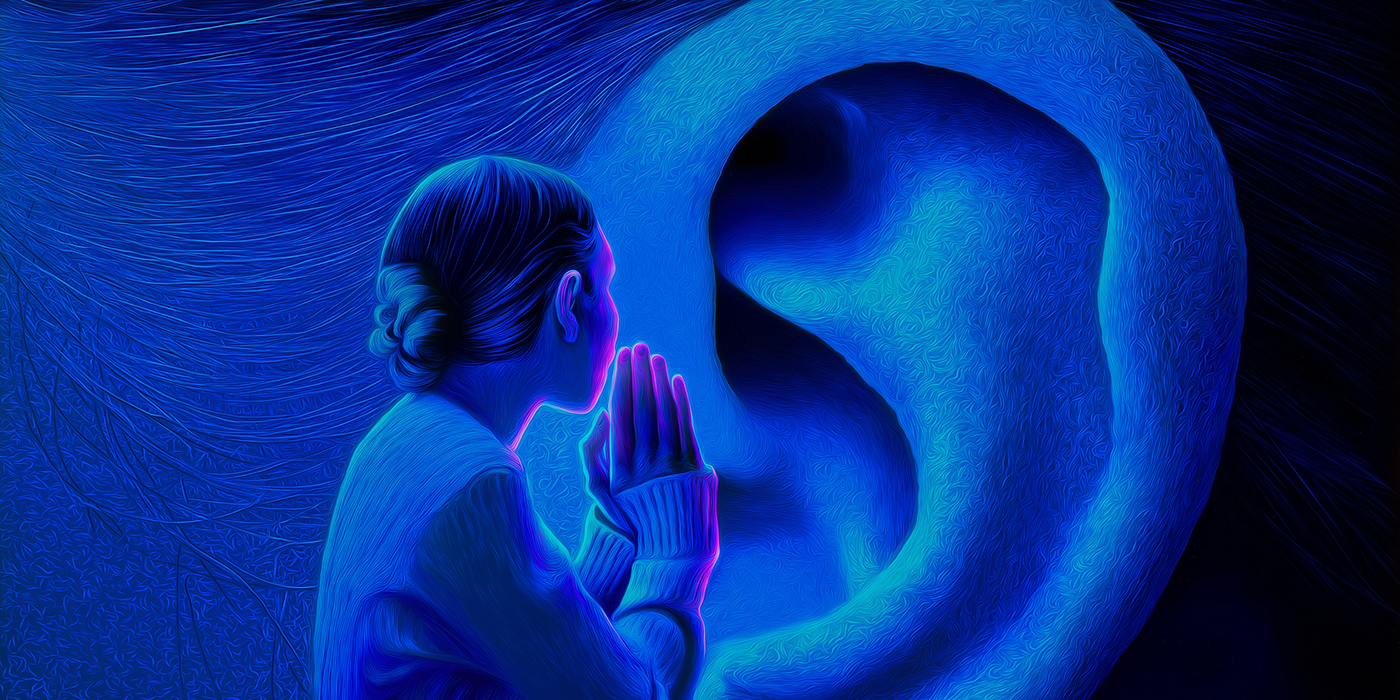Even as a child I had a sensitivity to noise. I came from a large family, and our house was always noisy and chaotic, with everybody talking at once. There also was a lot of yelling. I used to escape to the woods near our house for some peace and quiet. I liked to listen to the quiet rustling of the trees and hear the soft singing of the birds.
I liked church because it was quiet, and we weren’t supposed to talk. I think that’s one thing that made God and spirituality attractive to me—they were present in silence. Silence became a holy thing, a place to communicate with God.
SA meetings were balm for my soul, an antidote to the noisy crowd I carried around in my head. They began with a moment of silence. Only one person talked at a time, and everyone else listened. What a difference! I heard my Higher Power speaking to me in the voices of my SA friends.
A few years ago, I developed a problem with my hearing. Noises were magnified, especially sharp sounds like clapping or a door slamming. These sounds became painful to me, a shock to my nervous system from which I had to retreat to a quiet place to recover.
At the SA convention in Baltimore last year, I wanted to attend the SA birthday celebration, which had always been a highlight for me. But it was held in a rather small room instead of a big hall, and even as I approached the door the noise drove me back. So I bought a coin for myself at the literature booth. Then I ran into Sylvia J., and she very kindly presented my coin to me, with a prayer for my sobriety. (That coin is mounted on the wall in my bedroom today.)
So that’s the background I bring to the article that follows. I found it in a stack of old ESSAYs. Although it is not signed, the writing style somehow reminds me of Roy K. Plus there’s his use of the term “star system,” which he alluded to in one of his recorded talks—practically a literary fingerprint for him.
But whoever wrote it, it speaks for me, and that’s why I submitted it for reprinting. Obviously noise is an issue for me, and I like the author’s suggestion that we come up with an alternative to applause. But the author goes deeper—as Roy often did—to question the whole philosophy of “the applause meter.” Don’t we claim that we’re powerless over lust, that our sobriety is due to the action of a Higher Power? How can I take credit for my days or years of sobriety?
And what about the “popularity contest”? That’s something that has also bothered me. When the newcomer gets his chip, there’s a polite smattering of applause. When the popular fellow receives his coin, the din is tremendous! What message does that give?
I’m grateful to the anonymous author for challenging our accepted ideas and holding our practices to the prism of Divine Grace. So I ask with the author—how can we bring God into our sobriety celebrations? Could there perhaps be a way to celebrate gratitude with silence? If your group, Regional Conference, or International Convention Committee can suggest a different solution, please write to ESSAY.
Mike F., Rochester, NY
Who’s Keeping Us Sober?
Originally published in ESSAY, December 1991
I’d like to say something about SA birthday celebrations. I think we’re carrying it too far, going the wrong way with it. For example, in a recent regional SA convention, applause, whoops and whistles weren’t enough, there were horns. Razzmatazz. Is it a popularity contest? Who registers highest on the applause meter? Is this putting principles before personalities or personality before principle?
What are we doing? Giving glory to a person for staying sober? Did they really do it? If they did, what am I doing agonizing over Steps and God and surrender? What am I doing in SA? I’m still sober today—by the grace of God—and am deeply grateful for every day, month, and year that others have. “By all means, let’s keep our laughter and joy.” But something feels wrong about this, for us in SA, I mean.
Also, hugging is enough of a problem for some of us, why make it standard SA birthday ritual? I’ve been in meetings where the hugger had years less sobriety than the one getting the chip, or no sobriety at all! What kind of sickness is this? Plus, this seems to put the person giving the chip in a superior position!
On the constructive side, what would happen if we came up with something more suitable for our own SA situation? What if we acted in truth and used birthdays as an opportunity to somehow thank God together for that person’s sobriety? What if, instead of giving in to the “star” system or personal gratification, we tried to make it more of a spiritual thing?






